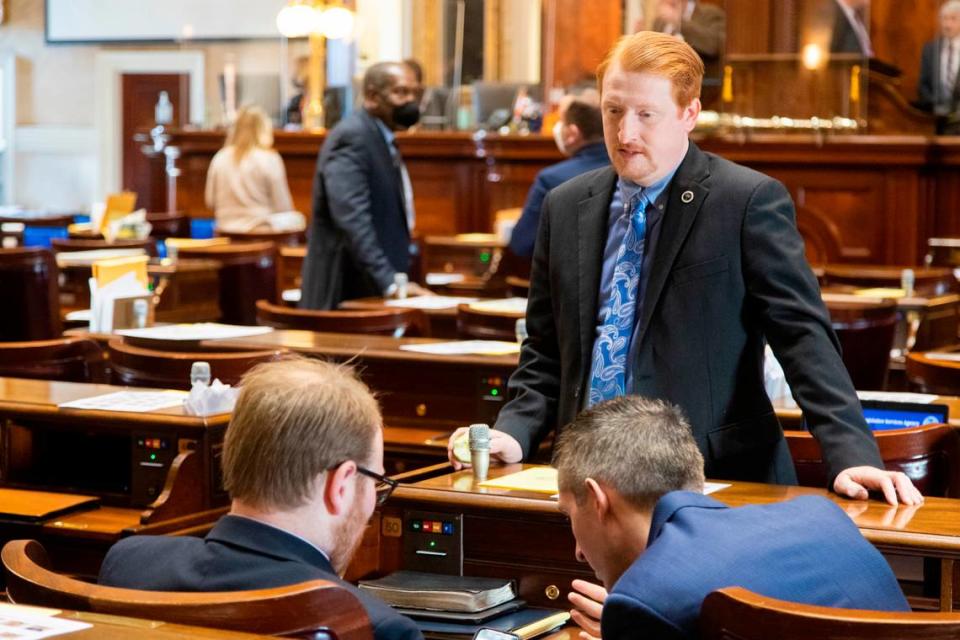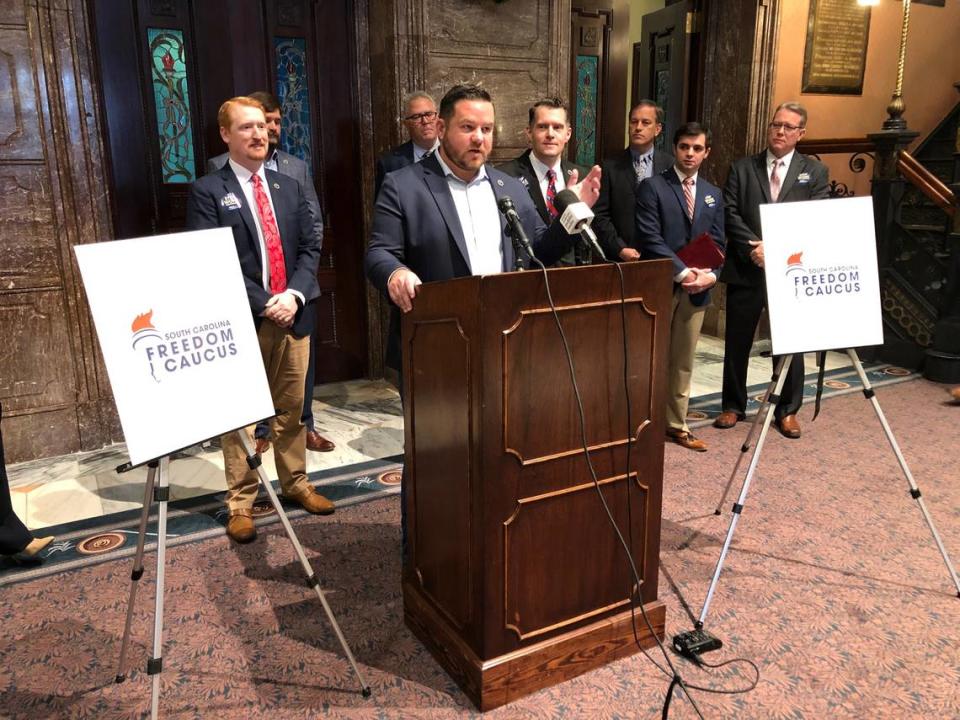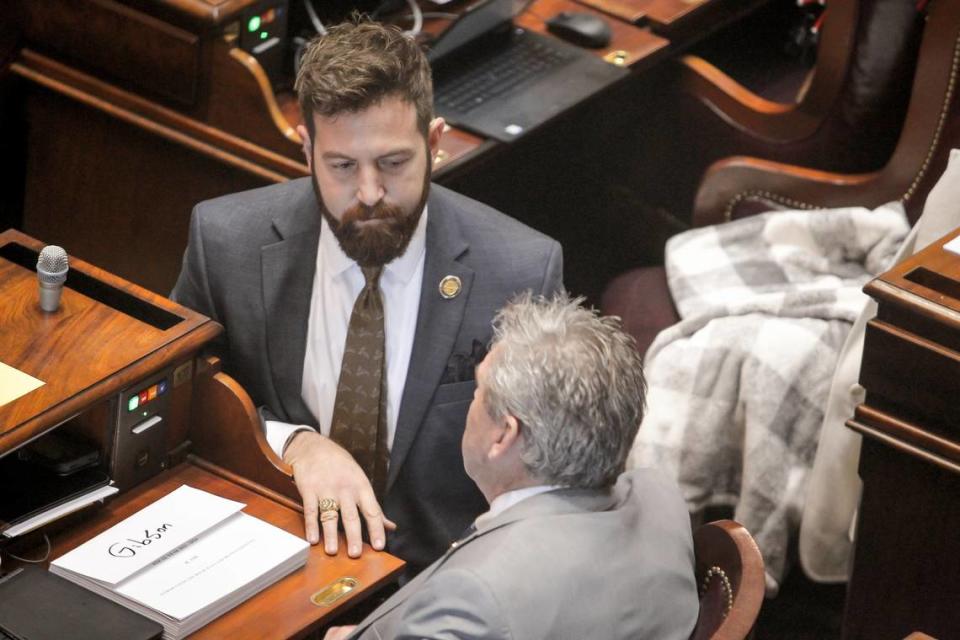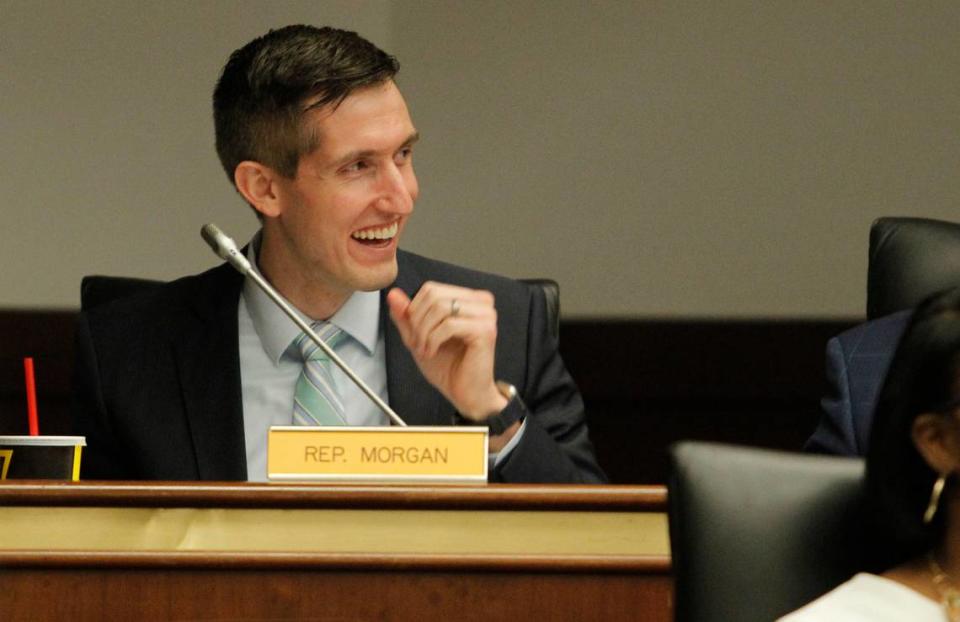Nuisance, danger or something more? How a far-right GOP faction is dividing SC’s State House
In so-called “ruby red” South Carolina, the greatest existential threat to Republicans may be boiling inside their own party, as friction grows between the mainstream majority and an upstart, hard-right faction of the party known as the House Freedom Caucus.
This group of no more than two dozen lawmakers has shown that obstruction can be an unexpected source of power, while gaining influence that a number of Republican leaders are reluctant to acknowledge.
Few among the state’s power players can seem to agree whether the group is a danger, a nuisance, or a future ruling party in itself.
More than 30 people – including lawmakers, political analysts, state government staffers and lobbyists – spoke with The State about the Freedom Caucus and its rise and influence. They altogether painted a picture of a subtle power struggle that is increasingly unfolding on a public stage in the chambers of the S.C. State House. Most of these people spoke candidly with The State on the condition of anonymity to protect their jobs and relationships.
Some political insiders emphasized that the Freedom Caucus’s power, while nontraditional, shouldn’t be ignored. They may have more power than others give them credit for.
After all, it was only about five months ago that U.S. Speaker of the House Kevin McCarthy – for a time, the most powerful Republican in the land – was ousted from his position thanks to just eight members of his own party, most of whom believed he wasn’t doing enough to advance an ultra-conservative agenda. If that could happen in Washington, what could another small but determined group of lawmakers do in Columbia?
There is growing concern within the South Carolina Republican Party that state House leadership does not know how to handle the Freedom Caucus and that Republicans are not defending themselves well enough against the group on social media and in-person attacks. The perception that party leaders aren’t defending themselves from attacks within their own party is a sign of weakness for the mainstream majority, some say, that could allow the Freedom Caucus to hasten its rise in power.
Known primarily for making noise about what they want, S.C. Freedom Caucus members have accomplished some feats, one of which, politicos note, is stalling legislation, from proposals about abortion to a day to honor female hunters. Its members consistently push ultra-conservative legislation – usually pertaining to culture war issues such as reproductive rights or “men in women’s sports” – and commit to making it known that mainstream House Republicans are not pursuing their version of conservative values to the same degree.
Some politicians argue this isn’t considered success at all. Others, however, say the caucus may be influencing the recent trend of new ultra-conservative legislation being filed by powerful House Republican members, forcing those lawmakers to make more right-leaning decisions than they would have originally.
What started as an unsuspecting rivalry has rooted itself deep within the heart of Palmetto State politics. Some say the Freedom Caucus is ready to wage war. Some say they’re nothing but noise and will soon fizzle out as quickly as they came to exist. Others, however, warn that they have already started a serious battle.
Conservative will never be conservative enough
To many South Carolina House Republicans, the Freedom Caucus is nothing more than a nuisance. A “disappointment,” “pain in the ass” and a “frustrating” part of their roles as legislators.
It was a Freedom Caucus member, Rep. R.J. May, who in 2023 turned a shoo-in bill to name a day in recognition of women hunters and fishers – supported by both Republicans and Democrats – into a three-hour debate over the definition of a “woman.”
That moment was, to some, an example of the “frivolous” tactics the group will use to stall legislation and hijack attention.
Stalling, obstructing, throwing rhetorical bombs into House debates and stirring up social media drama have been their modus operandi, and those methods are in many ways a part of what’s driven the wedge between the caucus and other Republicans, perhaps even more so than their conservative political principles.
“Try to act surprised that these guys are whining again,” Rep. Micah Caskey, a Lexington County Republican, tweeted about the Freedom Caucus in October.

Caskey has been vocal in person and online about his disdain for the group. Nobody ever fact checks them, he said, and no one from the group comes thoughtfully ready to govern.
Caskey, along with multiple other Republican lawmakers and political insiders all raised similar concerns and frustrations about the group: The Freedom Caucus does not operate for the good of South Carolina, detractors say; they work for attention. However, they’re mighty good at getting it.
One of the Freedom Caucus’ major battles with House Republicans came as the state Legislature was debating abortion restrictions in 2023. While the bulk of the debate was focused on what stage of pregnancy abortion should be banned, if at all, the Freedom Caucus proposed a bill that sought to punish abortion in the same way as murder, resulting in up to 30 years in prison and even up to the death penalty.
In the midst of that debate, Freedom Caucus members who sponsored the bill proposing the death penalty for abortion painted mainstream House Republicans – who already were seeking to ban the procedure as early as six weeks – as “abortion apologists,” one political watcher said.
Hyperbolic rhetoric is essential to the Freedom Caucus’s strategy, one political expert said.
“It’s flamboyant language for rallying up a conservative base,” said one politico who works outside the State House. “It’s a profound disservice to constituents.”
Conservative will never be conservative enough for the Freedom Caucus, another source said: It doesn’t matter how far right House Republicans move, the Freedom Caucus will find a way to bring up concerns about it so they can spotlight it in their favor.
While the Freedom Caucus accuses the Republican majority of letting Democrats “lead on reform while they kowtow and defend a corrupt system,” some House Republicans and Democrats alike publicly accuse of Freedom Caucus members of “whining,” “lying shamelessly for attention” and putting on a show to climb the political ladder.
To hear these clowns tell it, they’re responsible for the sun rising and setting too! #SCHFCwins https://t.co/ov4tKEbomq
— Micah Caskey (@MicahCaskey) February 12, 2024
“I’m trying to figure out where the camera is that’s recording you for your campaign speech for Congress,” Democratic state Rep. Russell Ott hurled at Freedom Caucus member Rep. Adam Morgan amid a heated six-hour debate in January over a bill to prohibit gender transition procedures for minors. (Morgan, who chairs the Freedom Caucus, is challenging Republican Congressman William Timmons in the Upstate 4th Congressional District in June’s primary.)
Another Freedom Caucus member, Rep. Josiah Magnuson of Spartanburg County, sought to toughen that bill by adding penalties for doctors, even though Caskey, a Republican and a lawyer, argued the state’s existing law already punishes doctors who violate statutes.
“You’re trying to undermine this amendment by pretending to be more for justice than me, which is a bizarre turn of the tables,” Magnuson said to Caskey.
Magnuson’s amendment failed.

The Freedom Caucus does raise important discussions, more than one House Republican member, and political analysts said. It’s necessary to have debates as lawmakers, they added. But caucus members’ timing and strategy often leave lawmakers and political watchers questioning the real intentions behind the caucus’s moves.
“I think they do wield power,” a person who works in the State House said. “Obstruction is their power. Not doing anything is their power. Any one vote is power. And when you are in Congress, for example, when you have eight people, that can change the Speaker of the House vote, right? That’s a big deal.”
Multiple people, including Republican House Majority Leader Davey Hiott have spoken about the success of the S.C. Republican Party over the last few years, specifically the surge of conservative legislation that has passed. Was this because of the Freedom Caucus pushing ultra-conservative proposals surrounding abortion, book bans, LGBTQ+ provisions, DEI and guns?
Almost every House Republican lawmaker who was asked answered: No, this wasn’t the doing of the Freedom Caucus, and it would have happened without them.
And Democrats, for the most part, don’t think the Freedom Caucus specifically has successfully moved conservative legislation into action.
But the Freedom Caucus believes the credit is theirs for a notably conservative shift in South Carolina lawmaking over the last few years, and some political watchers in the state agree. The Freedom Caucus claims that some of the state’s most conservative legislation has come because of them. This includes recent votes in the House to pass the “Help not Harm” bill, which prohibits minors from receiving gender transition procedures, and pushing for a more conservative version of a constitutional carry gun bill than the Senate passed.
While some Republican House members downplay the caucus’ influence, some insiders from both parties agree that the Freedom Caucus actually is responsible for painting the state a deeper shade of red. Beyond legislation, the group has shown the ability to have a potential influence on South Carolina voters’ perspective of Republican politics, whether it be through social media or mailers.
Some politicos say the more Republican leaders ignore that influence, the more the caucus’s power will grow.
“I think what we’re seeing in Columbia right now is that the Freedom Caucus is pushing issues and forcing leadership and the overall Republican Caucus to act on some of these issues,” Lexington County’s May said. “You know, most people think that South Carolina is ruby red, and it is, our people are. But the elected representatives, particularly those ones that are not in the Freedom Caucus, do not accurately reflect the values of the folks that they serve.”

When Southern gentlemen don’t get along
Freedom Caucus members would say they’re simply not in the business of doing business with moderates.
“By any objective measurement, South Carolina continues to fail in delivering conservative policy for our state, and that’s the reason the Freedom Caucus exists,” May said.
If that’s the “why” the caucus exists, then the “how” behind their split from mainstream Republicans is best explained as a two-sided tale that hinges on conflicts between conservative vs. more conservative, deceit vs. inaction, and loyalty vs. conformity.
The story of the split varies by who is asked, and, ultimately, the details are muddled.
What happened was an attempt at unity apparently gone badly wrong. Back in March 2022, House Republicans came together in a closed-door meeting to discuss what some remember as a talk about an election integrity law, while others recall it was about an absentee voting measure.
The meeting was to discuss how to push the bill forward as efficiently as possible. The bill being discussed – which some specifically recall as House bill 4919, which addressed absentee and early voting – wasn’t as conservative as some lawmakers hoped it would be.
Summerville Republican Rep. Gil Gatch was among those who would have liked the bill to be more conservative, but he ultimately wanted it to pass and be of use for his constituents.
“I’m a lawyer for God’s sakes,” Gatch said in a recent interview, “and I’m a normal human being where I realized that if I’m having a conversation with somebody, we’re trying to get to an end result that demanding it be done my way or else isn’t the best way forward. We have to figure out a way to work with each other. No bill is a perfect bill.”
But not everyone in the room saw it that way, according to about half a dozen people who were present for the meeting. As Gatch and others tell it, most of the lawmakers in the closed-door meeting had already agreed to move forward with the discussed version of the bill. But May, a freshman lawmaker who runs a political consulting business, proposed an amendment even after the majority of the group had agreed not to change the bill.
May’s amendment would have closed partisan primary elections so that only voters registered with a party could vote in that party’s primary election. Ultimately, May’s amendment was not adopted in the passage of the bill.
There were other amendments offered as well, but at least some House Republicans believe May had an ulterior motive behind his amendment.
Spartanburg County Rep. Travis Moore was facing an election challenge by a candidate who would hire May as his political consultant. A number of people in the room believe May used the amendment to maneuver an opportunity to cast Moore as not conservative enough in the next election, benefiting his candidate.
“(May) thought, ‘I’ll put up an amendment now that I know exactly how Travis is going to vote because I was in a closed-door meeting, so that I can use his no vote against my amendment as political mailers for the race that I’m going to get paid to run in the next year.’ OK, do you see how that’s insane?” Gatch said.

May, however, said he was not representing Moore’s opponent at the time of the closed-door meeting or when he presented the amendment. May eventually represented Moore’s opponent, Bill DeVore, but says he did not make contact with DeVore until weeks after the vote in question.
“Any attempt to tell you that I somehow set up a vote for anybody is (completely) false and fabrication,” May said.
An attempt by The State to reach DeVore for comment was unsuccessful.
Meanwhile, the S.C. House Freedom Caucus was officially formed April 20, 2022, with 13 members, May among them.
In the run-up to the June 2022 primaries, a political mailer in Moore’s district referenced House bill 4919 – the bill remembered by some as the subject of the closed-door Republican meeting and May’s unpopular amendment. It said, “Travis Moore voted to keep partisan primary elections open so radical Democrats can infiltrate the Republican primary and elect RINOS aligned with their progressive values.”
At the bottom, the mailer read, “Travis Moore has Gone COLUMBIA… It’s time to SEND HIM HOME!”

Moore would win the primary over DeVore, with 53% of the vote.
Gatch wasn’t the only person who recalled the series of events leading up to the primary unfolding this way. Multiple other Republicans and people in the meeting said they believed it was an orchestrated move that upset more than just Gatch. A significant number of House Republicans were confused by and felt betrayed by May’s actions.
“People lost their minds, because it was an egregious betrayal of confidence,” Gatch said. “If I am representing a plaintiff, and I am getting information underhandedly from the defendant and I’m going to be screwing the other party – I mean, that’s against the law for lawyers to do that. But in politics, again, it’s just business as usual.”
When asked about the meeting and accusations of maneuvering the vote, May said, “Secret, behind-closed-door meetings is exactly what’s wrong with Columbia. My number one concern is about my constituents and what they want, not what the establishment or special interests want.”
Election campaign finance reports show May was not paid by DeVore until after the amendment vote and the bill’s passage in the House.
Republican House members, however, said just because May hadn’t yet entered into a contract doesn’t mean he wasn’t planning or communicating beforehand.
In any case, House Republicans faced a new internal debate: How could they trust one another after what they believed May did?
The answer was a loyalty pledge, of sorts. In November 2022, a set of new House rules was presented. House Republican Caucus members would, among other things, agree not to engage in any campaign activities against any other member of the caucus.
“The foundation of the new rules was aimed at one person and one person only,” a source who works in South Carolina politics said. “And that’s RJ (May). It was not aimed at anybody else.”
May said he does not believe the loyalty pledge was created because of him. He said the pledge came about because a number of established Republicans had been beaten in the June primaries by Freedom Caucus-aligned candidates.
In other words, according to May: House Republican leaders demanded a pledge of loyalty to its members and to leadership-approved legislation, and anyone who didn’t conform could wave goodbye to chances of getting anything done in the State House or having any help getting reelected, much less gaining any power or influence. Those are the downsides of being on the outside of the mainstream Republican Caucus.
“We were told (by House Republican leaders) when we refused to sign their incumbent protection pledge that not a single one of our bills would move, not a single one of us would get a good committee assignment, not a single one of us would get $1 for reelection, and in fact that they would find challenges for each and every one of us when it came election time,” May said.
May and more than a dozen others refused to sign the pledge.
It solidified the split between the Freedom Caucus and the Republican Caucus, and the effects of that split are playing out with growing drama today.
Credit where it’s due, depending on who you ask
House Majority Leader Hiott, a Pickens County Republican, said he had and still has no problem with the Freedom Caucus.
“The whole last session, they would come to me and ask me for advice for how to get something done or needed some help, and I always helped them every time they asked me,” Hiott said. “I don’t have any problem with any of them personally. I like them all; I don’t have a bit of a problem with them.”

But at least some Freedom Caucus members have a problem with Hiott and with House Speaker Murrell Smith, a Sumter County Republican.
“I’m exceedingly disappointed in (Republican House) leadership,” said Greenville County Rep. Adam Morgan, chairman of the Freedom Caucus. “I don’t like (Smith’s) leadership. I like him on a personal level. I like a lot of people as a person, but as leadership, are you kidding? I absolutely would prefer to have a speaker who actually treats everybody with respect. If he started doing those things of course, I would support him and be thrilled with it.”
Smith declined to comment for this story.
Hiott said in his 19 years as a lawmaker, the last session was the most conservative year he had been a part of, so he doesn’t understand the disdain the Freedom Caucus has toward House leadership, he added.
“Just about every piece of legislation that got passed last year was a conservative piece of legislation, and the best I can tell they voted for just about every one of them. Every single bill that was out there they seemed to support it as well,” Hiott said. “If it’s all about ownership, that’s fine. I’m not about ownership, I’m for what’s best for the state of South Carolina.”
“We don’t care who gets credit. That’s not why we’re in this,” May said. “We’re in this to live up to our values and our ideals to protect the Constitution. If leadership wants to play games by taking the language from Freedom Caucus members, slapping a member’s name on it that isn’t in the Freedom Caucus, just so they don’t feel like they’re giving us a legislative win, that’s OK by us. We care about results.”
For results – depending on who you ask – look to the recent decision by the House to reject a Senate-amended version of a constitutional carry gun bill. Senators wanted to see the changes to the proposal that would include offering (but not requiring) training for gun owners, as well as adding penalties for people carrying without a concealed weapons permit if they were found guilty of a crime with a gun.
But the House said no. They had passed a version of constitutional carry in 2023 and sought to get their bill back to the way it was.
Behind the scenes, Freedom Caucus members said they were thankful that House Republicans “finally” followed their lead.
But Freedom Caucus members say they were surprised to see one of their original amendments – a move to strike and replace the Senate amendments, converting the bill back to the original House version –was proposed by GOP Caucus members without any Freedom Caucus names on the proposal.
“Realizing they were beaten, the @SCHouseGOP tried to save face and worked with Dems to move their copy/paste amendment in front of the FC one filed days before,” the South Carolina Freedom Caucus tweeted.
Freedom Caucus members also argue that House Republicans made similar moves on legislation regarding transgender care – rejecting a past proposal by a Freedom Caucus member and then, this session, proposing and passing a nearly identical piece of legislation primarily sponsored by mainstream Republican members. Rep. Thomas Beach, a Freedom Caucus member, was one of the recent bills co-sponsors, but the Freedom Caucus argued the GOP still did not consult them.
Every Republican, Freedom Caucus or not, has the same opportunities to promote their priorities and pass legislation as everyone else, especially in a Republican majority, Hiott said.
“I happen to be the majority leader, but I have one vote just like the rest of them do,” Hiott said. “I’m not out to get anybody. If they want to rejoin the caucus, they’re welcome back in tomorrow, they just need to sign. That’s where we are.”
‘Built on destruction’ and gaining power
South Carolina is “not Washington, D.C. Not at all,” House Minority Leader Todd Rutherford, a Richland County Democrat, said. “And I think that a lot of what the Freedom Caucus has done, even including the nomenclature they have chosen, is to be more like Washington, D.C.”
It’s a far cry to think of the South Carolina House ousting its leader in the way the U.S. House turned on Kevin McCarthy – but then, one might’ve thought it was a far cry to think of such a thing happening in Congress, until it did. All it took was eight upset members to unify. This begs the question, what could the Freedom Caucus accomplish?
One potential outcome of the Freedom Caucus’ influence is that yet another faction arises among House Republicans. This one, a small group, politicos emphasized, that has expressed recent growing concern with House leadership for not acting more boldly to shut down the Freedom Caucus’ attacks against the body online and in-person. Leaders have said there is a “plan” to address Freedom Caucus attacks, but these House Republican members say they haven’t seen any evidence.
“Look, there’s no doubt I could do a better job of being the majority leader,” Hiott said in response to the growing friction within his party. “I don’t question that for one second. I’ve had conversations with most of our members. We’ve talked through it. I agree I need to do a better job, but also agree that you can’t respond every time that happens. You can’t just respond on social media.”
Hiott emphasized that many of the Freedom Caucus attacks are on social media, and that’s not how you legislate. He said if lawmakers responded every time they were attacked online, they would never get anything done.
“My job and the job of the House leadership is to protect our caucus members,” Hiott said. “And that’s our whole goal. We’re going to campaign for them, we’re going to help them as much as we can. We’re going to do everything we can to protect our members.”
It’s the Freedom Caucus’ goal, however, to grow its own numbers in the House.
May said that if it weren’t for the “political powers that be in Columbia,” significantly more House seats already would belong to the Freedom Caucus.
“I think there’s probably a good chunk of 20, 25 (House) members who would vote quite often with the Freedom Caucus, if it were not for the threats from the ‘uniparty,’ the lobbyists, the special interests and the people who write the big checks,” May said.
May said mainstream Republican lawmakers are afraid to be associated with the Freedom Caucus for fear of retribution from House and party leaders, so they keep their distance – even though, for many of them, their positions aren’t far off.
But some House Republicans and Democrats say this is “fantasy talk.” If lawmakers supported the Freedom Caucus and wanted to be a part of it, they would. The fact that more House members don’t join the caucus says something, lawmakers from both parties said.
“From a Democratic point of view, it’s been interesting, because it’s watching a segment of the Republican Party that is seemingly built on destruction gain more and more power simply by their numbers,” Rutherford said.
Rutherford said the House Freedom Caucus brings to his mind a paraphrase of a saying by former Democratic U.S. House Speaker Sam Rayburn: “Any idiot can tear a building down, but it takes sophisticated and skilled people to build one.”
“Well,” Rutherford said, “I don’t get the impression from any of them that they want to do anything other than tear the place down. …They have no desire to build anything, and I don’t mean buildings, I mean simply a better mousetrap. I simply hear them spouting off about why everything around them is bad.”
While House leaders may outwardly say they aren’t concerned about the Freedom Caucus, House Republicans’ recent actions are making another statement: They want Freedom Caucus members gone.
The act of trying to squeeze out the Freedom Caucus has has played out in a few ways so far — including rumors of some Republican players and leaders offering hefty campaign dollars to political candidates who would promise not to associate with the Freedom Caucus.
However, Hiott said he had never heard of such instances and ethics rules wouldn’t allow that to happen.
One of the most recent moves that appears aimed against Freedom Caucus members such as May, is a bill that is expected to soon move to the House floor. House bill 5112, sponsored by York County Republicans Rep. Brandon Guffey and Rep. Heath Sessions, would prohibit a House member from providing assistance for compensation or anything of value to another candidate running for the House — in essence prohibiting all House members from working as political consultants on House campaigns against other members. The bill also would require House members to publicly report the names any candidates who pay them for campaign assistance, and the amount of money they are paid.
“House bill 5112 speaks to integrity of the institution of the House of Representatives above any one member,” Rep. Sessions wrote over text. “It simply states that if you are an elected representative in the S.C. House, you can not personally profit by running other candidates’ campaigns for a House seat. The potential conflict of interest is astounding. You must choose, serve the people of your district or serve your client by running their campaign. You can’t do both and not have your credibility called into question.”
The evidence of friction and a brewing power struggle is playing out on a weekly basis at this point on the House floor. Just this week, a tense exchange between Gatch and Morgan, two central figures of Republican vs. Freedom Caucus drama, happened during discussion of a bill that would restructure the state Department of Health and Environmental Control. Morgan accused Gatch of having an inappropriate tone, Gatch accused Morgan of side-stepping his question, and the exchange devolved into back-and-forth sniping.

Amid the bickering, Speaker Murrell Smith appeared confounded by how to rein in the feuding factions. He asked everyone to act with decorum, joking that he needed hearing aids because he didn’t hear all of the exchange from Gatch and Morgan
“Gentleman, now hold on a second, y’all know better than this,” he said to Gatch and Morgan.
“We’re not here to have personality conflicts,” Smith said. “We are here to debate legislation. If politics starts dividing this body and starts pulling us into the land of abusive and rude behavior, then we lose control of the process, and South Carolina is not served.”
The drama seems to be an endless cycle, as political watchers in the state more and more wonder what might be the ultimate effects on state government and the political landscape.
For now, as one politico put it: “The solution for House Republicans? Make sure Freedom Caucus members don’t come back. The solution for the Freedom Caucus? Get more of their type of legislators to make more chaos, media attention and money.”

